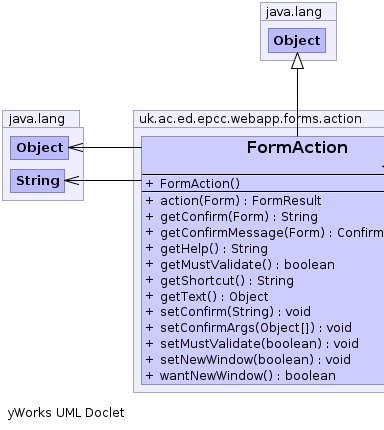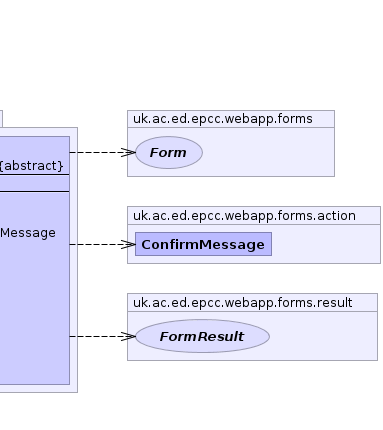- java.lang.Object
-
- uk.ac.ed.epcc.webapp.forms.action.FormAction
-
- Direct Known Subclasses:
- AddFieldTransition.AddFieldAction, AddStdIndexTransition.AddIndexAction, AvatarComposite.AddAvatarTransition.AddAvatarAction, AvatarComposite.AddAvatarTransition.RemoveAvatarAction, ChainAction, CodeAuthTransitionProvider.AuthenticateTransition.ProcessAction, CreateAction, DeleteAction, DisabledAction, DomTransitionProvider.EditAction, DomTransitionProvider.EditNodeAction, DropFieldTransition.DropAction, DropForeignKeyTransition.DropAction, DropIndexTransition.DropAction, DynamicFormTransitionProvider.AddXMLTransition.XMLUploadAction, DynamicFormTransitionProvider.DuplicateTransition.DuplicateAction, EmailChangeRequestFactory.RequestAction, EmailChangeRequestFactory.VerifyAction, EmailTransitionProvider.EditFormAction, ErrorProcessingFormAction, FormState.NextAction, FormState.ResetAction, LogFactory.ItemAction, MoveDateTransition.MoveDateAction, NestAction, PartManager.ChildCreateAction, PartPathTransitionProvider.AddXMLTransition.XMLUploadAction, PartPathTransitionProvider.ConfigTransition.ConfigAction, PartPathTransitionProvider.EditPartTransition.CancelAction, PasswordUpdateFormBuilder.CancelAction, PasswordUpdateFormBuilder.CancelLogoutAction, PasswordUpdateFormBuilder.UpdateAction, PersonalResponseTransitionProvider.CreateTransition.ViewAction, PreferenceTransitionProvider.SetFeatureTransition.SetFeatureAction, PreferenceTransitionProvider.SetPreferenceTransition.SetAction, RelationshipTableCreator.CreateAction, ResponseTransitionProvider.EditSectionTransition.CancelAction, RetireAction, RoleAction, SplitTransition.SplitAction, TextFileOverlay.TextFileDiffAction, TextFileOverlay.TextFileRevertAction, TextFileOverlay.TextFileUpdateAction, TotpCodeAuthComposite.SetToptTransition.setKeyAction, UnRetireAction, UpdateAction, ViewRelationTransition.ShowAction, XMLOverlay.XMLEditAction
public abstract class FormAction extends java.lang.ObjectA formAction represents an action button attached to a form When the button is pressed. Actions can request a yes/no confirm message. If validation is turned off then the state of the form is ignored and the action is run anyway. This is used to implement cancel actions.
-
-
Constructor Summary
Constructors Constructor and Description FormAction()
-
Method Summary
All Methods Instance Methods Abstract Methods Concrete Methods Modifier and Type Method and Description abstract FormResultaction(Form f)Perform the actual action based on the form parameters.java.lang.StringgetConfirm(Form f)should this action be confirmed before execute If this returns null no confirm is required.ConfirmMessagegetConfirmMessage(Form f)java.lang.StringgetHelp()Return an optional help text for this action that can be presented as a tooltip etc.booleangetMustValidate()java.lang.StringgetShortcut()Return an optional shortcut key for this action.java.lang.ObjectgetText()Get optional button content to use instead of the action name.voidsetConfirm(java.lang.String c)voidsetConfirmArgs(java.lang.Object[] args)voidsetMustValidate(boolean validate)voidsetNewWindow(boolean new_window)booleanwantNewWindow()
-
-
-
Method Detail
-
wantNewWindow
public boolean wantNewWindow()
-
setNewWindow
public void setNewWindow(boolean new_window)
-
action
public abstract FormResult action(Form f) throws ActionException
Perform the actual action based on the form parameters. Throw aTransitionExceptionto show an error message to the user. or aActionExceptionto produce a generic error message.- Parameters:
f- Form- Returns:
- FormResult
- Throws:
ActionException
-
getConfirm
public java.lang.String getConfirm(Form f)
should this action be confirmed before execute If this returns null no confirm is required. If not null it is the name of the confirm message in the confirm.propertiesThe form is passed to allow a sub-class to trigger confirm based on form parameters. However in this case the implementation must handle an incomplete form. Note that the message can be set by calling
setConfirm(String)or this method can be overidden- Parameters:
f- Form calling action.- Returns:
- String confirm name
-
getConfirmMessage
public final ConfirmMessage getConfirmMessage(Form f)
-
setConfirm
public void setConfirm(java.lang.String c)
-
setConfirmArgs
public void setConfirmArgs(java.lang.Object[] args)
-
getHelp
public java.lang.String getHelp()
Return an optional help text for this action that can be presented as a tooltip etc.- Returns:
- String or null
-
getText
public java.lang.Object getText()
Get optional button content to use instead of the action name. This can be aUIProviderorUIGeneratorbut should not include active content- Returns:
- Object to add
-
getShortcut
public java.lang.String getShortcut()
Return an optional shortcut key for this action.- Returns:
- String or null
-
getMustValidate
public boolean getMustValidate()
-
setMustValidate
public void setMustValidate(boolean validate)
-
-

